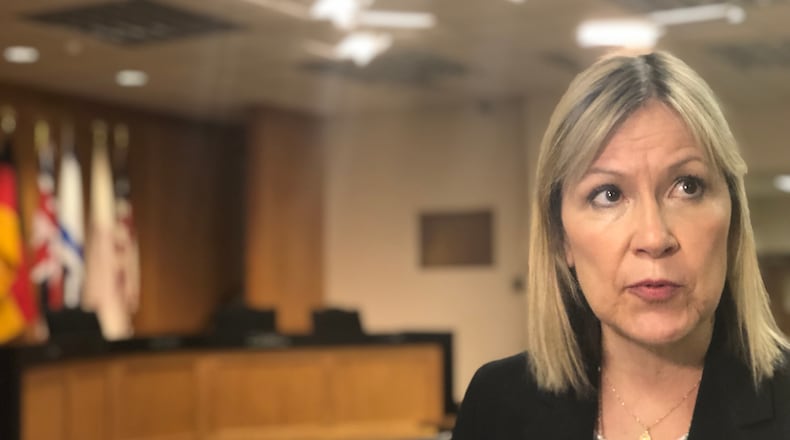Local employment saw a stunning and unprecedented drop in April, hurting the city’s income collections, which accounts for nearly 75% of its general fund budget.
Dayton officials say the city already has taken significant steps to reduce expenses and they are developing a “budget correction plan” to address an $8 million gap between revenues and expenses.
“The city manager moved quickly to address both the pandemic and the economic shock that it caused,” said Diane Shannon, Dayton’s director of procurement, management and budget. “It has not come without pain: positions have been abolished, employees were temporary furloughed and we closed two of the city’s three golf facilities rather than incurring deficits that would be covered through general fund support.”
Dayton’s general fund revenue declined $4.6 million to $15.7 million in April, compared to April 2019, according to city data.
April was the first full month where the financial impact of COVID-19 was felt.
In May, revenue was down $2.1 million from last year, a 15% decline, according to data released this week.
Before the pandemic, the city’s general fund finances were performing better than expected. Revenue was up 8.7%, or $3.9 million, in the first quarter of the year, compared to 2019, which the city described as “stellar” gains.
But the global public health emergency blew major holes in the city’s budget.
Income tax collections, which account about three-fourth of the city’s general fund revenue, were down $3.8 million, or 14%, in April and May, compared to last year.
Additionally, five other revenue categories have “underperformed,” including fines and forfeitures, licenses and permits, the local government fund, other intergovernmental sources and other charges for services, the city said.
Through the end of May, general fund expenses exceeded revenue by about $8 million.
To try to cut costs, the city says it has frozen hiring, except for essential services, and eliminated all vacant positions across the organization.
About 100 budgeted vacant positions were abolished that saved the city $7.2 million in overall compensation costs, including 41 positions in the general fund, Shannon said.
The city has reduced capital investments by $7.3 million, Shannon said, and procurement of non-essential goods and services has been suspended.
About 96 employees signed up for a voluntary separation program aimed at reducing personnel costs, which is expected to save the general fund $3.3 million this year, the city said.
The city says it is working on a budget correction plan because officials believe the economic pain will continue. The city says it expects the 2021 budget will be challenging.
“We are reducing staff through a voluntary separation program, limiting expenditures to essential services/functions only and shuttering millions in capital projects,” Shannon said. “Our 2020 budget correction plan detailing all of these actions and other budget cuts is currently under development.”
The second half of this year could be just as bad, or worse, economically than the first half of the year, said Dayton Mayor Nan Whaley.
Whaley said the city expects to lose $9 million to $13 million this year because of COVID-19 and about $13 million next year.
“We are seriously concerned, and the choices we have to make are not good choices,” she said.
The city needs federal financial assistance to avoid cuts to critical services, likely including personnel, Whaley said.
Life-saving, public safety services might have to be cut, and so might others that are important to the quality of life in the city, like trash and streets, she said.
The economy will not fully recover from this crisis until there is better treatment or a vaccine, she said.
The city has been awarded about $30.4 million in federal CARES Act funding, which was approved through a coronavirus rescue or stimulus bill, officials say. But they say that money cannot be used for plug revenue holes.
About the Author



